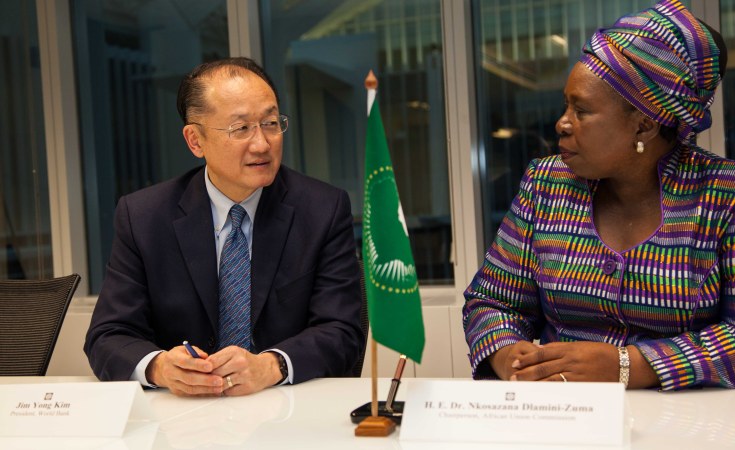Former Chief Economist of the World Bank's Africa division, Shantayanan Devarajan, argues that SAPs may not have worked in the '80s and '90s, but that they have in the past 15 years.
On 7 May, 2013, Think Africa Press published an interview with Shantayanan Devarajan, then Chief Economist of the World Bank's Africa division, entitled World Bank: "Structural Adjustment Programmes Worked in Africa", in which he argued that SAPs were a major reason behind Africa's current economic growth.
On 25 November, Carlos Lopes, Executive Secretary of the Economic Commission for Africa, wrote a reply to Devarajan, refuting that SAPs had been successful. Below is Devarajan's rejoinder to Lopes, which was originally published as a comment under Lopes's article.
I welcome Carlos Lopes' reply to my interview with Think Africa Press, both as an opportunity to clarify what was - and was not - said; and to engage in an evidence-based discussion about Africa's structural transformation.
First, what I said was that the reason for Africa's recent growth was that "African policymakers followed Structural Adjustment Programmes over the last 10-15 years"(emphasis added).
This is different from saying that SAPs worked in Africa during the structural adjustment era of the 1980s and 1990s.
Unfortunately, the headline "World Bank: 'Structural Adjustment Programmes Worked in Africa'" was ambiguous. Lopes seems to have used the second meaning, claiming that "SAPs were in fact not successful in achieving their desired objectives of increasing investment efficiency or reinvigorating growth... "
I agree with this statement, which I have made in several publications. But the reason they failed, as we document in the book Aid and Reform in Africa, is not that the policies were wrong, but that they were imposed from outside, without enough consideration as to whether there was a domestic political consensus for the reforms.
Starting in the early 2000s, African governments took greater control of their reform programmes, many of which were designed in the countries themselves.
The actual policies - controlling fiscal deficits and inflation, allowing markets rather than governments to determine prices, reducing state control of the banking sector - were not that different from those of the structural adjustment era. But this time, they delivered results because they represented a domestic political consensus.
Lopes also seems to disagree that these policies contributed to Africa's recent economic growth, saying that the growth was "underpinned by a commodity boom and the emergence of development-oriented political regimes... "
But Africa has seen commodity booms before, including in the 1970s, but they never translated into such a long period of sustained economic growth. The difference was that in the 2000s, macroeconomic policies were better.
When the 1970s commodity boom ended, African economies suffered immensely. But in 2009, when commodity prices fell due to the global economic crisis, most African countries were able to cushion themselves thanks to the prudent economic policies of the previous decade.
Here too, I think Lopes agrees because he lists "prudent macroeconomic management" among the list of factors that fuelled Africa's recent economic growth.
Industrial policy
The rest of Lopes' reply is about the case for a more active industrial policy in Africa to achieve structural transformation. Although the topic was not discussed in my interview, I am happy to engage on it, especially since I have written about it elsewhere.
In our article in Foreign Affairs, Wolfgang Fengler and I make the same point that Lopes does, namely, that despite a decade and a half of relatively rapid economic growth, African countries have not achieved structural transformation.
Lopes seems to think that the reason is the lack of industrial policy to address the many market failures. However, the evidence points in another direction: most of the constraints to Africa's transformation are government failures, not market failures.
For instance, high transport costs along Africa's roads are mainly due to profits accruing to trucking companies whose monopoly power is guaranteed by regulations (and the fact that, in many countries, the president's family members own the trucking company).
Similarly, Lopes attributes Africa's weak human capital to the cutbacks in social spending from the structural adjustment era. But the evidence is that, in public schools in Tanzania, Kenya, Senegal and Uganda, teachers are absent about 20-30% of the time. When present, they spend about a quarter of their time teaching.
Doctors, whose absentee rate is even higher, spend an average of 29 minutes a day seeing patients. And money allocated to public health clinics leaks at alarming rates - 99% in Chad. In light of all these government failures, it is not clear that an increase in public spending in education and health will lead to better human development outcomes.
Finally, active industrial policy has already been tried in Africa: this was the import-substitution strategies of the 1960s and 1970s.
Everyone - including advocates of industrial policy today like Joe Stiglitz and Justin Lin - agrees that they were a colossal failure, mostly because of political capture.
The challenge today is to design policies to minimise the inexorable tendency for politically powerful people to capture them for their own interest.
There are no easy answers, but some form of transparency and citizens' holding government to account - by, for example, information campaigns and the use of mobile-phone technology for two-way communication between government and citizens - will have to be part of the solution.
Shantayanan Devarajan is the Chief Economist of the World Bank's Middle East and North Africa Region.


